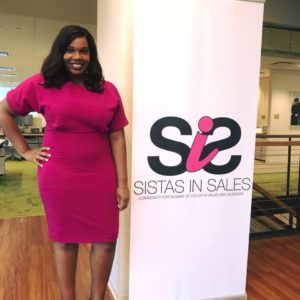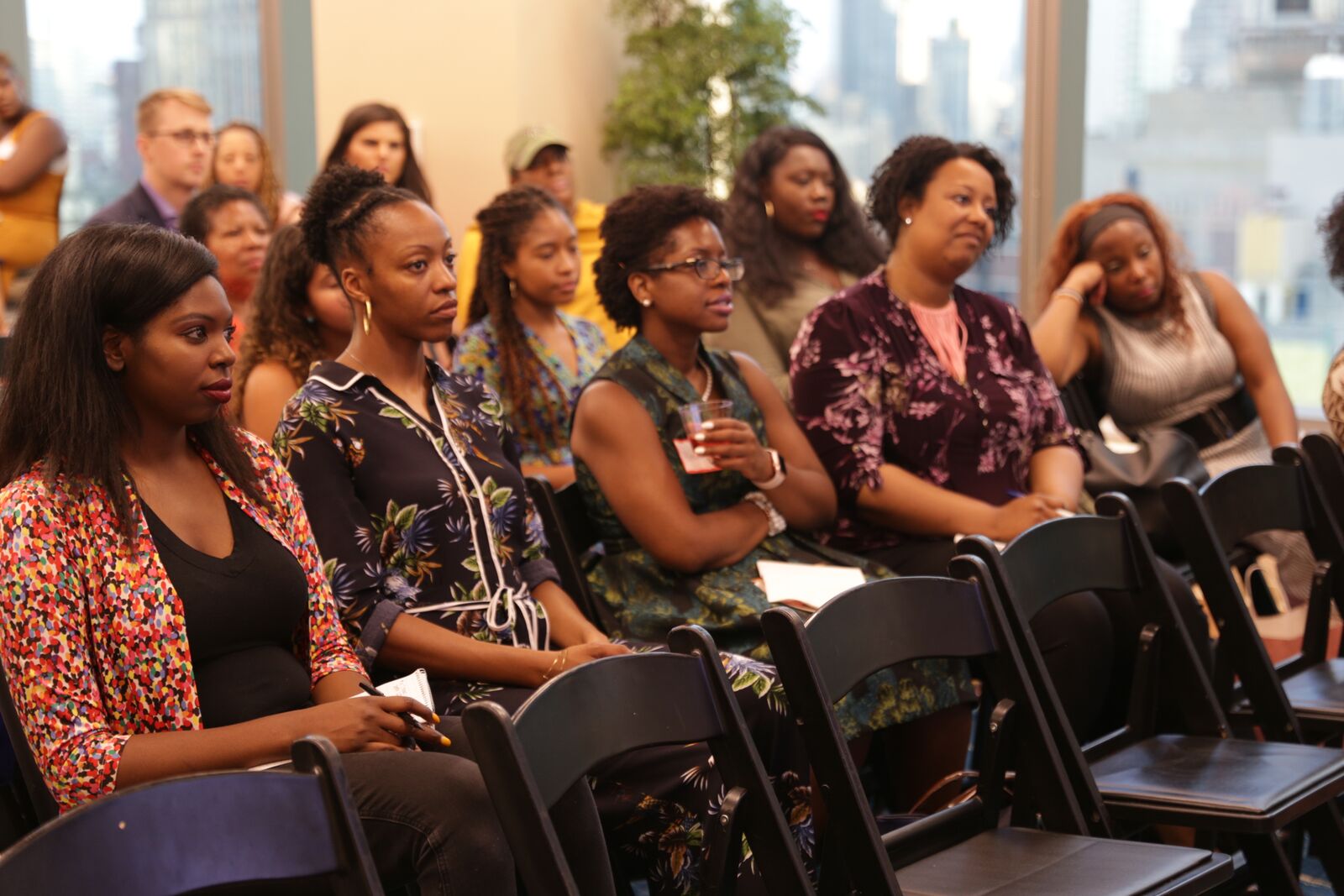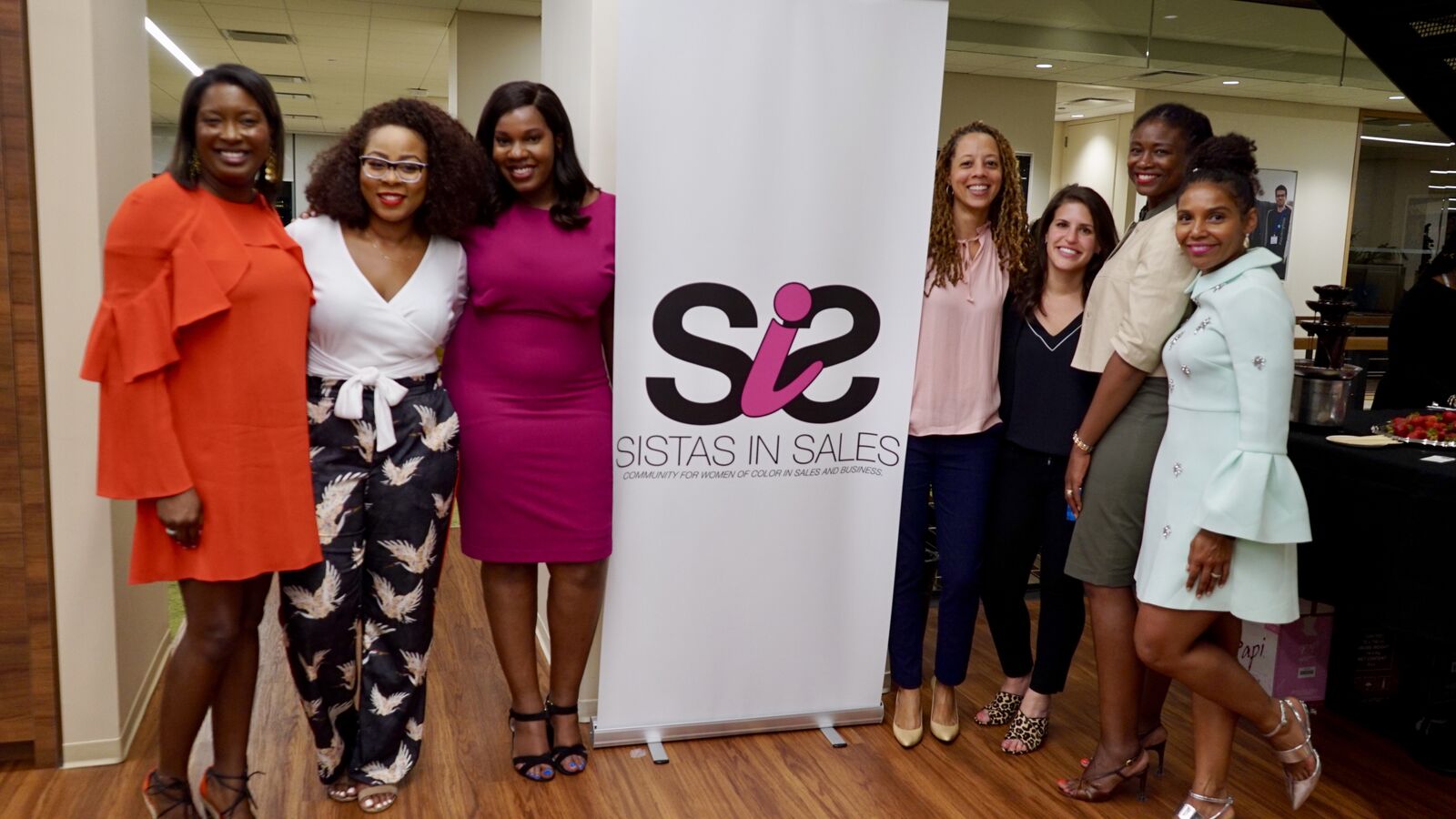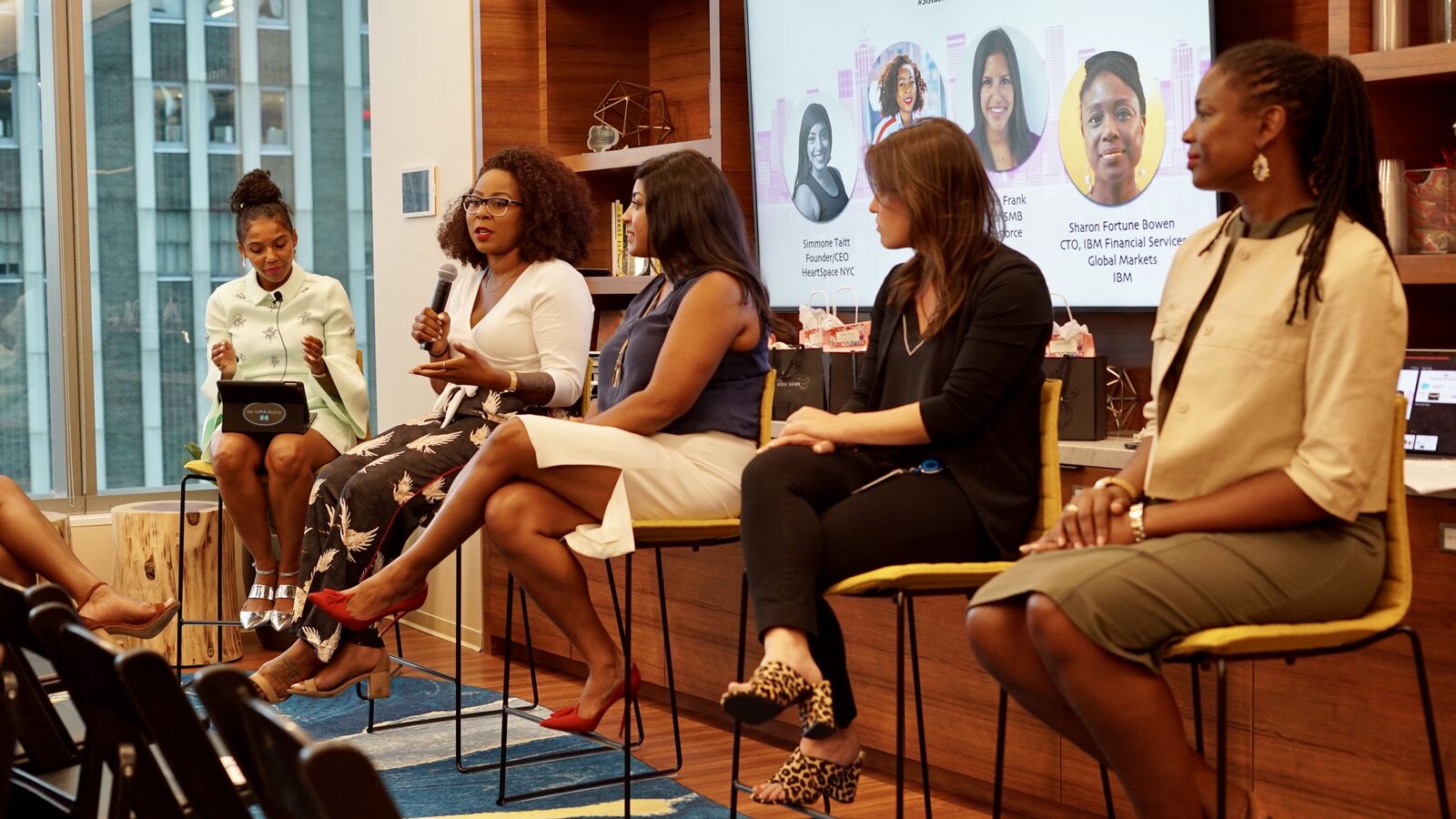Let’s start off with some numbers for women of color:
3.8% of all board seats in the Fortune 500 in 2016 were made up by women of color.
5.0% of all executive/senior-level officials and managers were women of color in 2016.
9.8% of all first/mid-level officials and managers in this same list were women of color.
Fewer than 1 in 30 C-suite leaders is a woman of color
Yet, despite facing more pitfalls to advancement, women of color have higher ambitions to be a top executive than white women, according to McKinsey’s Women in the Workplace report from 2017.
Meet a Face Fighting for Change
It’s this drive that fuels the work of Chantel George. Chantel is the founder and CEO of Sistas in Sales, a community for women of color in sales to find sisterhood within their career tracks, mentorship from VPs/veterans, and education in their fields to reach financial freedom.


But let’s rewind a few years back before this organization existed. A daughter of immigrants from the Caribbean, she never imagined a career for herself in sales even though “she was always selling — from piano lessons to movie tickets.” Only when she came across Yelp in NY in 2013 (before the hiring boom, back when they had 70 people in a small office in Manhattan) did she fall into sales, as most of us say we do.
The Importance of Representation
While at Yelp, she started as a local account executive before becoming a Sales Manager with 17 direct reports. She found that being a manager gave her the creative freedom to create her own curriculum. She was able to show the people on her team her own version of sales.
“It’s interesting because as a black woman there weren’t any other black female managers at the company at the time. So I loved the fact that I could take control of my narrative and show them a version of what a black woman could look like that’s not what they’re seeing in the media. I love that.”
Further reflecting on the impact her presence as a black woman in management may have had on these young, often new college grads, I heard her voice swell, “Especially because some of these AEs (Account Executives) were just out of college. And some of them had come from really small towns, moving to New York on a relocation team. This was their first experience with a black woman in power. So I really prided myself in being there and giving them valuable information.”
Sensing the Void and Filling It
She eventually worked on the Mid-Market + National teams. She was also a part of the starting chapter of DiverseBurst, the Diversity and Inclusion ERG for people of color. Events created during her time as co-chair was adopted in Chicago and SF.


Despite this work, she didn’t feel like she was going to be tapped on the shoulder for a bigger position, “That was a little discouraging. I didn’t see anyone who liked me and I needed a mentor. I wanted to know where the other black women, or women of color, were that were doing a really good job.”
Recognizing the lack of black women, and women of color, in leadership roles helped her imagine how she could fill them for people like her — people searching for a mentor and someone to help them in their career journey. “I had lots of conversations with other women that were selling. I started asking other people things that led to more answers.”
Building a Community
This led to the creation of Sistas in Sales and their first event called “A Seat at the Table”, where several women of color got together as a sort of “focus group.” Chantel gathered these saleswomen from a variety of industries and asked them questions like, “What would you do if I created this community, organization? Would you go? Invite your friends? What would you need to see from me for this to be valuable?”
Creating this community has allowed Chantel open the doors for women of color, and particularly black women, who are either trying to get into Sales or who might not have thought about sales as a career possibility because of roadblocks they face, starting at home:
“I was brought up in the Caribbean culture and your parents think there are only two careers: doctor or lawyer. If you’re not in one of those career tracks, then you just don’t know what’s out there. You’re not aware that Sales is actually a lucrative career. It’s not discussed in the household and this lack of education is one early roadblock for women of color.”


Breaking Down Doors for Future Generations
As you get older and grow up though, this lack of knowledge around what sales truly is and the kind of career it can give you presents another roadblock, “People have this misconception of what Sales truly is. People think about the car salesman, the telemarketer. Or think someone who is bothering someone. They don’t think about someone who’s in a profession where they are bringing value and making organizational shifts.”
But why do people think this in the first place? There are a number of reasons that play into the cultural perception of salespeople. But for black women, there is a pretty obvious one.
“There are not a lot of black women, and women of color, who are sales leaders that are showing these young girls the lifestyle that they could have. Showing them the way they can communicate with other people and having that example is so important.”
Knowing how to sell is important especially now that everyone is trying to strike out on their own and start their own businesses, “A lot of minorities want to start businesses but end up saying I don’t know how to sell. If we could just dispel that notion that Sales is bad, that this is a career they can think about earlier, maybe then they’ll fall into sales more intentionally in the future.”


The Future of Women of Color in Sales
When I asked her about the future of sales, she sounded cautiously optimistic, “I think the tide is changing. I think people are becoming open to the idea now. People will come up to me specifically about sales roles. I think women are trying to hone in on their soft skills which come naturally to us and make us an automatic great candidate for these positions. So things are getting better, but it’s taking time. And I hope to create more awareness which is the biggest thing, we should be proud of what we do.”
Looking Forward
And what about the future of Sistas in Sales? Well, their recent event, “The Common Denominator,” gathered seasoned black saleswomen from companies such as Conde Nast, LinkedIn, IBM, and Google. These saleswomen spoke on their struggles, experiences, and gave advice. This provided another opportunity for young black women to see that this is a possible future for them. That Sales isn’t a career to be dismissed or one only for straight, white men.
After this major event, Chantel found that a lot of D&I professionals from major tech companies were coming up to her and asking if they can partner together. Moving forward, she said she’d love to nurture this arm of the business. By partnering with these companies, she can “hold the door open for young women. Provide them with opportunities, and expose them to careers they didn’t think were possible for them. Or for opportunities they didn’t think they were qualified for.”


Creating Community
So the first step in that process is creating the community. The next was enabling communication which they’ve done via a Slack channel for women of color in sales across the country. Now they can start introducing women to larger corporations where they are trying to get their foot in the door. They’re also working on helping women who are starting their own businesses. Sistas in Sales provides training on what a career in Sales looks like and scaling a sales team. They also connect them with sales execs who can provide some guidance.
Words of Advice for Women of Color in Sales
And for that young woman of color who is struggling in their current sales role, Chantel had a simple message that cannot be overstated,
“Be your authentic self. I know that sounds so cliche, but Sales is all about you as an individual. What comes out of your mouth, how you relate to the customer. So the more in line with yourself you are, the less you mimic your colleagues or your manager and the more you end up speaking your own truth. You’ll find it’s then easy to relate to others. And it’s not even about the product, it’s about that 1:1 relationship with the prospect.”
And if you’re struggling as the only black saleswoman on the team, or in the company, know that “if you need anything, contact me. I’d be more than happy to talk. You can join the Slack channel, it’s all free. I’d just love to be a resource for anyone in that position.”
After speaking with Chantel, I’m reminded of this quote from McKinsey’s 2017 Women in the Workplace report. The report said, “Women of color, particularly black women, face even greater challenges.” While that isn’t inherently surprising, it makes the work women like Chantel is doing even more remarkable.
And it puts the onus on us, the rest of us. We must continue supporting, uplifting, and provide a platform for their voices, their stories in whatever way we can.
You can find Chantel on LinkedIn and join/read more about Sistas in Sales on their website, Facebook, and Instagram.
And make sure to join their mailing list to get details on their next event on September 27, 2018, in New York.






